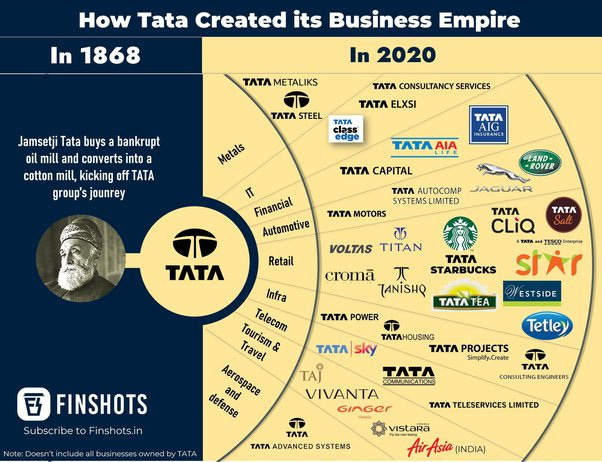The Tata Group: A diverse conglomerate committed to social responsibility and technological innovation
From philanthropy to emerging technologies: The fascinating story of India's largest and most respected business entity
Contributed by India analyst and investor Bhaumil Patel.
The Tata Group is a fascinating conglomerate that has been a part of the Indian business landscape for over 150 years. Founded in 1868 by Jamsetji Tata, the group has grown to become one of India’s largest and most respected business entities, with operations in over 100 countries and revenue of over $100 billion.
One of the most interesting aspects of the Tata Group is its commitment to social responsibility. From the very beginning, the company has been focused on giving back to the communities it serves. In fact, Jamsetji Tata once famously said, “In a free enterprise, the community is not just another stakeholder in business, but is, in fact, the very purpose of its existence.”
This commitment to social responsibility is evident in the group’s many philanthropic initiatives, which include funding education and healthcare programs, promoting sustainable development, and supporting environmental conservation efforts. The Tata Group also established the Tata Trusts, which are among India’s largest philanthropic organizations and have played a significant role in driving social change across the country.
Another interesting aspect of the Tata Group is its diverse portfolio of businesses. The group has interests in a wide range of industries, including steel, automotive, information technology, hospitality, and telecommunications, among others. This diversification has helped the company weather economic downturns and has positioned it well for future growth.
In recent years, the Tata Group has also been at the forefront of technological innovation. For example, Tata Consultancy Services (TCS), the group’s IT services subsidiary, has become a global leader in digital transformation and has been recognized as one of the world’s most innovative companies. The group has also invested in a number of cutting-edge startups and is exploring emerging technologies like artificial intelligence, blockchain, and quantum computing.
Historical facts
Here are some interesting and lesser-known historical facts about the Tata Group:
The Tata Group’s founder, Jamsetji Tata, was one of India’s greatest philanthropists. In 1892, he founded the JN Tata Endowment to support Indian students who wanted to pursue higher education abroad. Since then, the endowment has provided financial assistance to thousands of Indian students.
The Tata Group’s first venture was a trading company called Tata & Sons, which was established in 1868. The company started as a small trading firm, but over time, it expanded into a major business conglomerate with interests in a wide range of industries.
The Tata Group played a significant role in India’s independence movement. In 1903, Jamsetji Tata donated Rs. 1 lakh to the Indian National Congress, which was then a fledgling political organization that was fighting for Indian independence.
The Taj Mahal Palace Hotel in Mumbai, which is one of India’s most iconic landmarks, was built by the Tata Group. The hotel was completed in 1903 and has since hosted many famous guests, including Mahatma Gandhi, Charlie Chaplin, and Barack Obama.
The Tata Group played a crucial role in developing India’s aviation industry. In 1932, the group founded Tata Airlines, which later became Air India. Tata Airlines was India’s first airline and was instrumental in the development of the country’s aviation infrastructure.
The Tata Group’s steel company, Tata Steel, played a significant role in World War I. The company supplied steel for the construction of battleships and submarines, and its production facilities were used to manufacture munitions for the British Army.
The Tata Group has a long-standing relationship with Harvard University. In 1896, Jamsetji Tata donated $25,000 to establish the Tata Fellowship at Harvard, which provides funding for Indian students to study at the university. Over the years, the Tata Group has donated more than $50 million to Harvard.
These historical facts demonstrate the significant role that the Tata Group has played in India’s development and its impact on various industries, including aviation, hospitality, and steel.
Investment rewards
The Tata Group is a massive conglomerate that offers investors exposure to a wide range of industries, including steel, automotive, information technology, hospitality, and telecommunications. With a market capitalization of over $250 billion and operations in over 100 countries, the Tata Group is one of India’s largest and most respected business entities.
Investing in the Tata Group offers a number of advantages. One of the biggest advantages is the group’s diversified portfolio. By investing in the Tata Group, investors gain exposure to a wide range of industries, which can help to reduce risk and provide more stable returns. Additionally, the group’s businesses are spread across different regions, which can help to mitigate geopolitical risks.
Another advantage of investing in the Tata Group is its commitment to social responsibility. The group has a long history of philanthropy and has established numerous initiatives to support education, healthcare, and environmental conservation. This commitment to social responsibility can help to enhance the group’s reputation and mitigate risks associated with negative social and environmental impacts.
In terms of financial performance, the Tata Group has a strong track record of growth and profitability. The group recorded revenues of over $100 billion, which have grown at a compound annual growth rate of over 12% over the past five years, and its net profit margin has consistently been above 8%. In addition, the company has a solid balance sheet, with a low debt-to-equity ratio and healthy cash reserves. This strong financial performance is a testament to the group’s diversified portfolio, technological innovation, and operational efficiency.
Finally, the Tata Group’s leadership team is highly respected and has a proven track record of success. The group’s current chairman, Natarajan Chandrasekaran, has been credited with transforming the group’s IT services subsidiary, TCS, into a global leader in digital transformation. Under his leadership, the Tata Group has continued to expand its operations and invest in emerging technologies.
Conclusion
Overall, the Tata Group is a remarkable business. Investing in the Tata Group offers investors exposure to a diversified portfolio of businesses, a strong commitment to social responsibility, a track record of financial performance, and a respected leadership team. As the group continues to grow and evolve, it will undoubtedly continue to be a major force in the Indian and global business landscapes.






